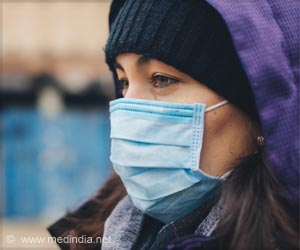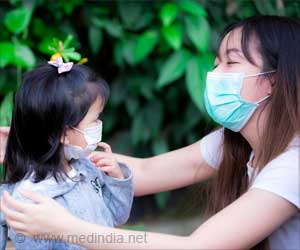With the lifting-off of rules for wearing a mask, anxiety levels soar up in certain individuals after the coronavirus outbreak. No-mask anxiety can be reduced through simple steps.
- With a lowering of severity in COVID-19 cases, Centers for Disease Control and Prevention (CDC) has announced to lift off the mask mandates for vaccinated groups
- However, these new back-to-pre-pandemic life/new normal reform has brought in yet another diagnosis — “no-mask anxiety” among many
- No-mask anxiety creates an excessively higher sense of uneasiness/anxiety on removing the masks
TOP INSIGHT
With the lifting-off of rules for wearing a mask, anxiety levels soar up in certain individuals. Read on to cope with no-mask anxiety through simple steps.
Read More..
What is No-Mask Anxiety?
No-mask anxiety is a condition where individuals (all age groups including kids) fear or feel uneasiness at the very prospect of removing off their masks in public. As per the scientific evidence, developing a new habit requires an average of 66 days.The reassuring effect (from the perils of COVID-19) brought in by the mask mandate at the beginning of the pandemic (almost like a security blanket) has now been inculcated into a regular habit — intense enough that one may even feel “naked” without the mask.
Moreover, as the public realm shifts into the post-pandemic era, experts state that this (no-mask anxiety) may increasingly become a common diagnosis.
Life under the Security Blanket
The devastating effect of the pandemic has accustomed several people to their newer lifestyle modifications. Wearing the mask and social distancing have presented a sense of protection and control (against the COVID-19) during this seemingly weary journey of ambiguity.These reinforced behaviors of wearing a mask allowed many people to cope with the deleterious facets of life amidst the pandemic.
Let Go of the Fear!
However, these rigorous lifestyle reforms may now inculcate an equally stronger feeling of anxiety (especially for those living with vulnerable members) as the mask mandates swipe off for vaccinated individuals in several places, thereby creating difficulty in adjustments.“If you’re vaccinated and have a regular immune system, you are highly protected from contracting COVID-19,” according to Laraine Washer, MD, Michigan Medicine’s epidemiologist, and an infectious disease physician. “Breakthrough cases in vaccinated individuals are rare and when they occur, they tend to be mild. We are not seeing fully vaccinated people require hospitalization due to COVID-19 infections. As the community rates of COVID-19 transmission decrease, vaccinated people can safely begin to remove their masks.” However, “vaccinated patients, who are immunecompromised, such as organ transplant recipients, should continue to wear masks and discuss a plan with their doctors,” says Washer.
No More Mask Custom
With the gradual replacement of new-normal rules, experts also caution staying mindful regarding the more vulnerable population (elderly populations, chronically ill, and immunosuppressed individuals).“Masks are just one prong of the multi-prong approach to limiting the transmission of COVID. The change in mask mandate is promising in that it is signaling a nearing of the end of this pandemic.” “Masks have always been about protecting others as much as they have been about protecting ourselves, and we must enter this new phase with the same attitude,” says Dr. Khalilah Gates, an associate professor of medicine in pulmonary and critical care at Northwestern University Feinberg School of Medicine.
Although an appropriate level of anxiety is acceptable with the new custom, a higher level of worry may harm the overall well-being of the individual. Hence, the public health officials are simultaneously justifying the science and solid evidence behind these new changes of mandates that may help many to overcome their anxiety.
Managing ‘No-Mask’ Anxiety
“Our brains have evolved specifically to detect threats. Since the pandemic began, the fear center of our brains has been activated by seeing people unmasked. We’ve been pairing the experience of fear, including the fear of illness and potential death, with the experience of seeing someone unmasked, for more than two years. So it will take some time to unlearn that process or unpair those two experiences,” says Abigail Hardin, PhD, a psychologist and assistant professor at Rush University Medical Center.To “unlearn” this fear mechanism, it is important to apprehend the “difference between a possibility and a probability.” Some of the measures that may help one to unlearn this fear are:
- Admit your feelings (although different from others), accept and acknowledge them; do not judge your feeling or be harsh to yourself.
- Give yourself time to adjust to a new reality at your own pace.
- Communicate your perspective and needs appropriately by setting boundaries with others.
- Confront your anxiety by asserting yourself to socialize.
- For people with weakened immune systems, it might be beneficial to maintain social connectivity virtually, in order to overcome the feeling of being left out.
- Consider respecting the changeability of everyone (friends or family).
- “Don’t let anxiety define you.” Seek out help through friends/family/therapists!
“The only way out is through” — Robert Frost
References :
- Managing ‘No-Mask’ Anxiety - (https://www.rush.edu/news/managing-no-mask-anxiety)
- Masks Off, Anxiety Up: Dealing with No-Mask Anxiety - (https://www.goodtherapy.org/blog/Masks-Off-Anxiety-Up-Dealing-With-No-Mask-Anxiety)
- No more masks but more anxiety for some - (https://news.northwestern.edu/stories/2022/02/no-more-masks-but-more-anxiety-for-some/&fj=1)
- Mask anxiety, face coverings and mental health - (https://www.mind.org.uk/information-support/coronavirus/mask-anxiety-face-coverings-and-mental-health/)
Source-Medindia
 MEDINDIA
MEDINDIA




 Email
Email










